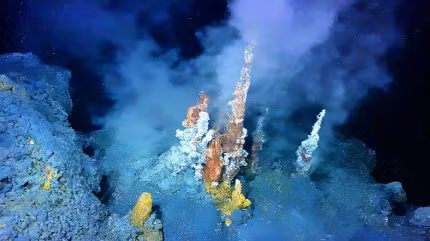In a bold move set to reshape America’s approach to rare earth mineral extraction, President Donald Trump signed an executive order authorizing the expansion of U.S. deep-sea mining efforts.
The order paves the way for extensive operations both in domestic and international waters, aiming to bolster the nation’s access to critical minerals essential for defense, energy, and advanced manufacturing.
White House officials touted the decision as a major step toward reducing America’s reliance on China, which currently dominates the rare earth mineral market.

According to senior aides, the initiative could unlock over a billion metric tons of polymetallic nodules—mineral-rich, potato-sized rocks found on the deep ocean floor—and potentially inject hundreds of billions of dollars into the U.S. economy.
READ ALSO: Asian, European Markets Gain While U.S. Stocks Dip Amid Uncertainty Over Trade Talks
Under the new directive, the Secretary of Commerce has 60 days to streamline the licensing process for exploration and commercial mining beyond national borders. The move seeks to accelerate U.S. entry into the deep-sea mining race, a sector still in its early stages but rapidly gaining traction as global demand for rare earth elements soars.

These minerals are vital for powering electric vehicles, renewable energy systems, military technologies, and high-performance electronics. The executive order also emphasizes forming international partnerships to counterbalance China’s growing dominance over seabed resources.
Trump’s move comes amid ongoing global efforts to regulate deep-sea mining. The International Seabed Authority (ISA), a United Nations-affiliated body, has been working for over a decade to create a legal framework to oversee international deep-sea mining activity. However, the U.S.—not a member of the ISA—is charting its own path.

Just last week, American firm Impossible Metals submitted a request to begin leasing operations in waters surrounding American Samoa. By operating within U.S. jurisdiction, the company sidesteps ISA oversight, further underscoring Washington’s pivot away from international regulation.
READ ALSO: Nigeria’s Poverty Crisis: More Citizens Likely to Fall by 2027 — World Bank Warns
The economic potential is staggering. A senior administration official claimed the U.S. could generate up to $300 billion in GDP and create 100,000 new jobs over the next decade through deep-sea mining initiatives.
However, environmental organizations are sounding the alarm. Critics argue that mining the ocean floor could lead to irreversible damage to fragile marine ecosystems, many of which remain largely unexplored.

“Fast-tracking deep-sea mining is an environmental disaster in the making,” said Emily Jeffers, a senior attorney at the Center for Biological Diversity. “Trump is trying to open one of Earth’s most fragile and least understood ecosystems to reckless industrial exploitation.”
READ ALSO: Nigeria’s Oil Exports in Limbo as Unsold Crude Threatens Economic Stability
In a surprising twist, Canadian mining startup The Metals Company recently announced plans to bypass the ISA altogether—despite previously advocating for the body to establish industrial-scale mining regulations. The firm now seeks U.S. authorization, signaling a possible trend of companies turning away from international governance structures in favor of national approval processes.

As the U.S. doubles down on deep-sea mining, the battle between economic ambition and environmental responsibility is heating up. With vast financial gains on the horizon and growing geopolitical competition, the deep-sea could soon become the next contested frontier—raising critical questions about how we balance innovation, sustainability, and sovereignty in the world’s last unexplored wilderness.
Discover more from Scoop Hub
Subscribe to get the latest posts sent to your email.

